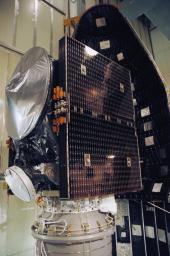
|
Dawn Spacecraft Ready for Payload Fairing Installation
- Click the image above for a larger view
- Full-Res JPEG (2000 x 3008) (914.5 kB)
- Full-Res TIFF (2000 x 3008) (18.1 MB)
Caption:
The Dawn spacecraft's solar array wings are folded to fit inside nose section of protective fairing.
Background Info:
Dawn, part of NASA's Discovery Program of competitively selected missions, was launched in 2007 to orbit the large asteroid Vesta and the dwarf planet Ceres. The two bodies have very different properties from each other. By observing them both with the same set of instruments, Dawn will probe the early solar system and specify the properties of each body.
The Dawn mission to Vesta and Ceres is managed by JPL, a division of the California Institute of Technology in Pasadena, for NASA's Science Mission Directorate, Washington. The University of California, Los Angeles, is responsible for overall Dawn mission science. Other scientific partners include Planetary Science Institute, Tucson, Ariz.; Max Planck Institute for Solar System Research, Katlenburg-Lindau, Germany; DLR Institute for Planetary Research, Berlin; Italian National Institute for Astrophysics, Rome; and the Italian Space Agency. Orbital Sciences Corporation of Dulles, Va., designed and built the Dawn spacecraft.
Cataloging Keywords:
| Name | Value | Additional Values |
|---|---|---|
| Target | 1 Ceres | 4 Vesta |
| System | Main Belt | |
| Target Type | Dwarf Planet | Asteroid |
| Mission | Dawn | |
| Instrument Host | Dawn | |
| Host Type | Orbiter | |
| Instrument | ||
| Detector | ||
| Extra Keywords | Color | |
| Acquisition Date | ||
| Release Date | 2009-05-29 | |
| Date in Caption | ||
| Image Credit | NASA/JPL | |
| Source | photojournal.jpl.nasa.gov/catalog/PIA12018 | |
| Identifier | PIA12018 | |
